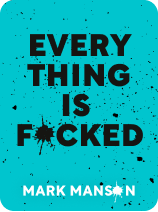

This article is an excerpt from the Shortform book guide to "Everything Is F*cked" by Mark Manson. Shortform has the world's best summaries and analyses of books you should be reading.
Like this article? Sign up for a free trial here.
What are Mark Manson’s views on religion? Why does he claim that religion, hope, and suffering are inseparable?
According to Mark Manson, religion can be problematic. He contends that believing in a religion that provides hope for the future paradoxically leads to suffering. Manson argues that no ideology can deliver on its promise of a pain-free future and will often cause conflict with those who hold different beliefs.
Read on to learn about Mark Manson’s views on religion, according to his book Everything Is F*cked.
Mark Manson on Religion & Living a Hopeful Life
According to Everything Is F*cked by Mark Manson, religion and hope are two inseparable topics. Manson claims that once you manage to align your emotions and values, you reap the benefits of a life with something to hope for. It feels like your life matters, and you find satisfaction in trading pain in the present for a future without pain. Unfortunately, Manson argues, this worldview also results in a life of suffering—and the vast majority of people live by it. The even worse news is that hope is what motivates us to make others suffer, as we’ll see.
In this article, we’ll explain Mark Manson’s views on religion and hope, and how they each interact to cause suffering, according to his book Everything Is F*cked.
Hope Requires Religion or Ideology
To begin, we’ll share Manson’s definition of hope: You believe that you have the ability to pursue something of value and have others recognize you for it. People often disagree on what constitutes the “something of value” that you should pursue. Further, people clump together in groups based on shared values, reinforcing each other’s beliefs and encouraging one another to keep pursuing what they believe is valuable.
Manson calls these groups “religions,” but we can also use the broader term “ideologies,” since they include both spiritual groups and secular groups. Ideologies like this include political parties, religious faiths, and corporations—any group of people pursuing something they find more meaningful than anything else.
According to Mark Manson, every ideology or religion has a primary virtue, something adherents believe is more valuable than anything else (Manson calls this primary virtue a “God Value”). Political parties value political control above all else. Religious faiths value spiritual obedience above all else. Corporations value profits above all else. The members of every ideology share a key belief: By pursuing our primary virtue, we can trade pain in the present for a less painful future. This belief is what gives them hope. Manson claims that every source of hope is an ideology of some kind.
Religion or Ideology Causes Us to Suffer
Mark Manson argues that unfortunately, the hope you get from religion or an ideology will always cause you to suffer. No ideology can always deliver on its promise of a less painful future because life is, and always will be, painful. This is true on a biological level: No matter what your external circumstances are in life, your brain will always settle into a state of dissatisfaction. This is what helps us survive—evolutionarily, constant dissatisfaction is what motivates us to keep engaging in productive action.
| Primary Virtues: Different Paths to the Same Moral Ideals Mark Manson asserts that different religions and ideologies are built around fundamentally different values. However, in The Righteous Mind, Jonathan Haidt argues that all humans are emotionally driven to promote the same universal, evolutionarily programmed moral ideals: care, fairness, loyalty, authority, sanctity, and liberty. A society closer to these ideals is the less painful future that people of all ideologies hope for. In Haidt’s view, Manson’s concept of a “primary virtue” is less of a moral ideal in itself and more of a means to bring about moral ideals—a “how,” not a “why.” For example, a Mormon only values obedience to that religious code because they hope such obedience will bring about care, fairness, and so on. However, if all ideologies are trying to reach the same moral ideals, why do they take the form of conflicting groups? Haidt argues that this isn’t a purely logical conflict—ideologies don’t just disagree on how to achieve the same ideals. Instead, conflict occurs because people with different ideologies emotionally favor the six moral ideals to varying degrees. For instance, although a Mormon values all these moral ideals, they may see sanctity as somewhat more important than liberty. According to Haidt, this framework gives us a wealth of insights into our modern political conflict. He explains that liberals typically appeal more to care, liberty, and fairness while conservatives favor loyalty, authority, and sanctity. However, Haidt argues that because conservative rhetoric often appeals to all six moral ideals while liberal rhetoric stays away from more conservative ideals, conservative movements typically have an advantage in persuading the public to support them. For example, a conservative politician may appeal to the public’s sense of fairness by arguing that policies like affirmative action aren’t fair, but a liberal politician would have a harder time appealing to the public’s respect for just authority. |
Hope Causes Us to Make Others Suffer
According to Mark Manson, when religions and ideologies fail to bring about a better future, adherents don’t just blame themselves—often, they also blame the members of a competing ideology. In other words, they come to believe that everyone would be living lives free of pain if it weren’t for the people preventing them from pursuing their primary virtue further. Every ideology does this to some extent.
Furthermore, there’s no way to decouple hope from interpersonal conflict. Hope requires you to constantly progress toward a better future. For this reason, after you’ve done everything possible to pursue your primary virtue in your own life, the only meaningful pursuit you have left is to battle against others with conflicting goals. In other words, dominance over others is the only never-ending source of hope.
This has been the cause of all conflict and warfare throughout history, insists Manson. Every time a nation tries to conquer another, or a religious group crusades to convert or kill those of another faith, it’s because such an endeavor gives them hope. If you allow hope to be the primary motivation behind your actions, you’ll inevitably end up hurting people in the name of a greater good that doesn’t exist.
| Humans Don’t Need Ideology to Hurt Each Other Some evidence suggests that most of the time, humans don’t even need the promise of a painless future to cause each other to suffer. In The Lucifer Effect, Philip Zimbardo argues that most of those who committed history’s most cruel atrocities didn’t do so because they were ideologically motivated or looking to blame and dominate a member of a competing ideology. Rather, they were just in the wrong place at the wrong time. Zimbardo asserts that in the right conditions, our immediate surroundings can disrupt our sense of morality on a biological level, causing anyone to willingly inflict extreme suffering on someone else. Specifically, you’re extremely likely to commit evil if a nearby authority figure is ordering you to do something immoral and if you can’t be held accountable for your actions. Zimbardo cites the famous Milgram experiment, in which a psychologist ordered volunteers to administer electric shocks to a “fellow volunteer” (who was an actor pretending to be shocked). When the psychologist agreed to take full responsibility for the experiment and ordered the volunteer to keep administering more painful shocks, 65% of volunteers shocked the actor into unconsciousness. They were willing to severely hurt—or even kill—another person just because someone “important” was there giving orders and taking responsibility. That said, Zimbardo also acknowledges that group norms can pressure us into doing evil, too. To make sure your group’s ideology doesn’t coerce you into conflict or violence, Zimbardo advises being more critical of your group than others to counteract our natural bias. If you find yourself in a group that doesn’t share your morals, leave and find another group as soon as you can. |

———End of Preview———
Like what you just read? Read the rest of the world's best book summary and analysis of Mark Manson's "Everything Is F*cked" at Shortform.
Here's what you'll find in our full Everything Is F*cked summary:
- How the hopelessness epidemic is affecting society
- Why you must abandon hope in order to live a fulfilling life
- How to practice a life without hope and instead, find meaning






